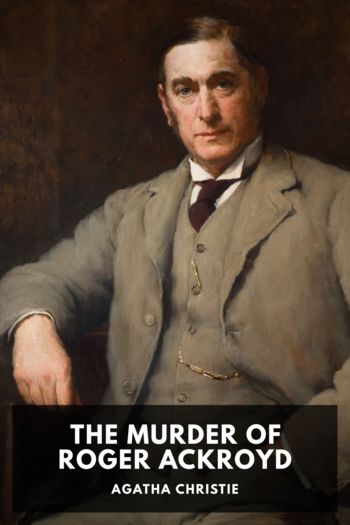The Clerkenwell Tales Peter Ackroyd (nice books to read TXT) 📖

- Author: Peter Ackroyd
Book online «The Clerkenwell Tales Peter Ackroyd (nice books to read TXT) 📖». Author Peter Ackroyd
Drago locked and bolted the door. “Show me your buttocks, like a she-ape in the full of the moon.” He knelt down and pulled off the priest’s shirt and hose. “Phew! Your breeches are stained with your arse.”
“Agnus Dei, qui tollis peccata mundi, miserere nobis.”
“You are a lost man.” Drago walked over to a wooden chest, from which he took out a whip of lead. The cleric looked up at him again imploringly, and then closed his eyes. “You are a sack filled with shit.” He raised the whip.
“Peccavi.”
He let it fall. “You are a parcel of dirt covered under clothes.”
“Clamavi.”
A few minutes later Drago left his master’s chamber, whistling, and went out into the fields for a game of archery.
On the following Friday the canon preached at Paul’s Cross on the need for a statute de heretico comburendo, so that the Lollards might be burned at Smithfield. Among the crowd assembled before the Cross were William Exmewe and Emnot Hallyng. They avoided each other’s eyes.
Chapter Six
The Franklin’s Tale
Garret Barton, the franklin and predestined man, was walking through the Great Gate to the south of St. Paul’s Cathedral. He could not help but consider how many pilgrims had gone to their damnation along this cobbled path. The air itself seemed rank with their shrill cries, like the putrid smell of other churchyard matter. Garret was one of the most ardent of the foreknown ones who, at Exmewe’s instigation, had written on a parchment “The Eighteen Conclusions.” He had rolled it carefully and placed it in the pocket of his coat. A wrestling match was being conducted in the usual place, an open space just behind the tomb of the parents of St. Thomas Becket, to the cries of “Yis!” and “Nay!” from the spectators. Outside the charnel-house, a scrivener had set up his stall; on a board above him had been painted a hand holding a pen. He stared solemnly at the franklin, as if divining his purpose in coming to this place.
The clock in the belfry stood at two as Garret Barton entered the cathedral by the west door. It smelled of the stables. All the sounds of the tradesmen and the hucksters mingled in the great vaulted space, and resembled the strange buzzing and humming of thousands of bees; it was a still roar and a loud whisper, much like a sea of voices and of footsteps. Barton could just make out the slow chanting of the pilgrims who clustered around the gleaming shrine of St. Erconwald. This world was nothing but a cherry fair! The barristers stood by their respective pillars, awaiting clients, their scarlet hoods scarcely visible among the press of porters, stall-keepers and priests. Hay had been strewn across the cold and shadowy stone floor of the nave. It would have been a dark place, even in the middle of the day, were it not for the candles and torches blazing upon the images and the painted walls. A broad band of sunlight crossed the nave, but it seemed pale against the glistening pillars.
The franklin approached the shrine and noticed with distaste the little limbs, modelled out of clay or lead, which hung there as objects of intercession; a clay penis was swaying beside a crippled leg, in the cool wind of human breath, as the people murmured their prayers to the golden figure of the saint whose alb and mitre were encrusted with bright jewels. He could see the monks peering at the pilgrims from the wooden watching chamber, where they guarded the holy treasures; one of them had fallen asleep. There was a faint smell of urine in the air, together with the smell of old stone and the familiar odour of humankind. A man was fumbling with his leather hose in a corner of the transept. And this was Garret’s thought: What is praying but piss against a wall? He walked back down the aisle among the dogs and pedlars. Three candles for a penny. Two Spanish onions for a penny. Five biscuits for two pennies.
Yes, there was singing at the high altar. This plainchant was supposed to be pleasing because it copied the music of the spheres; its pattern was precise art-metricke, or geometry. It explored the length and the breadth, the depth and the height, of sound. These voices encircled each other like the heavenly spheres; they passed smoothly over each other as if they were already part of the empyrean, their marvellous moving and wonderful turning combined to create harmony. Then the voice of a boy rose up in the psalm, “Quam dilecta tabernacula tua,” and it seemed to Garret Barton to be the voice of one raised up against the many. It was the sounding of the soul outside the Church Universal. It was his voice, lucid and melodious, until once more it was caught up in the divine machinery of noise. The choir had answered with “Domine virtutum!”
He leaned his forehead against the stone screen which stretched below the rood displaying the crucified figure of the Saviour. It was said that the rosemary tree could never grow taller than the height of Christ. He looked up at the painted image, scarred and suffering. Could it be true, as the astrologers claimed, that the infant body of Christ was influenced by the planets and the constellations? That his death was prefigured in the stars? That would be strange indeed, if creation could have power over its creator. Yet it was no more strange that, as William Exmewe had taught the predestined ones, God must sometimes obey the Devil. It was time.
Garret Barton walked out of the north door into





Comments (0)